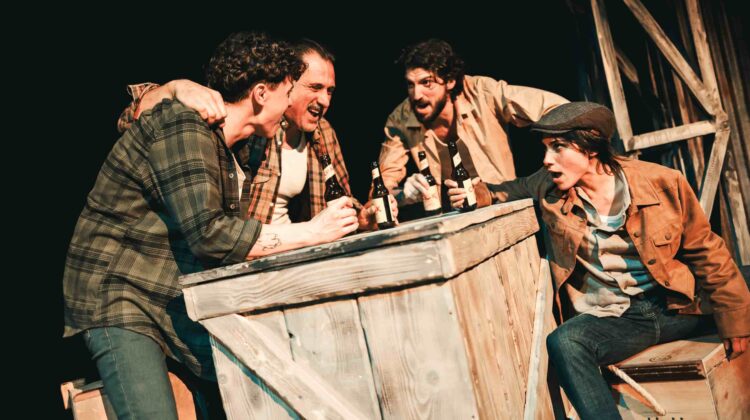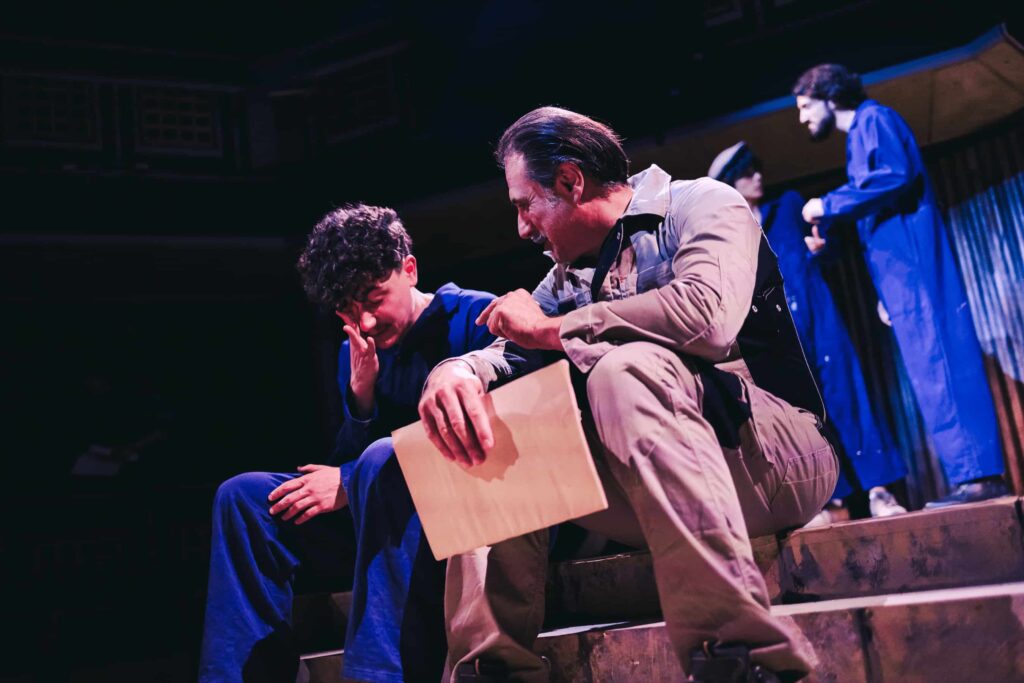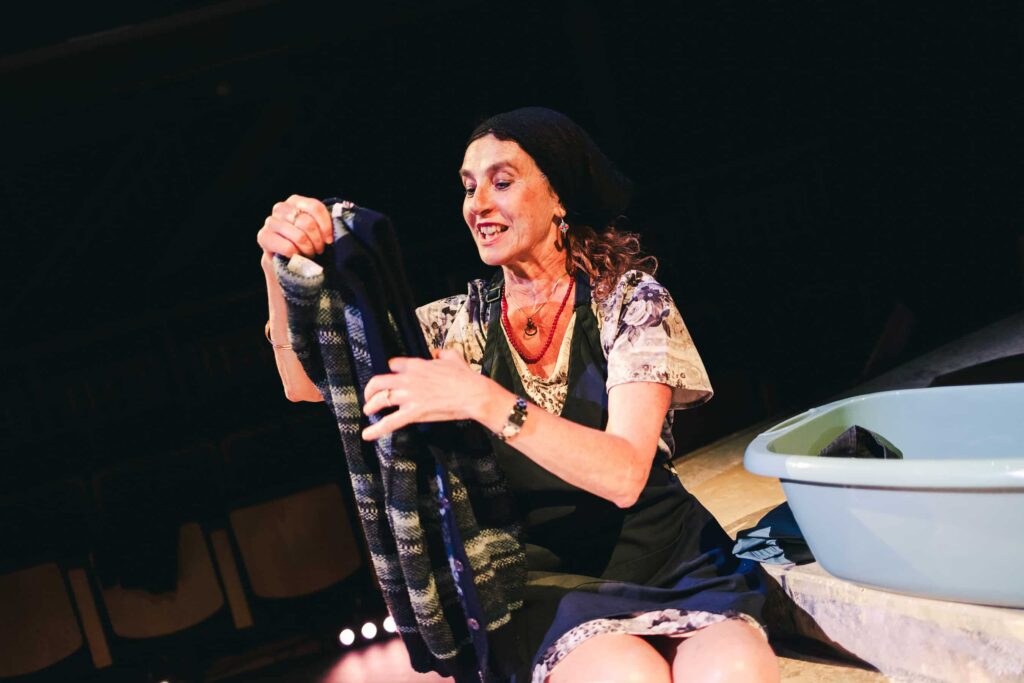
Il-Manifest tal-Qlub Maqsuma cast. Photos: Spazju Kreattiv
We are closing in on the 40 year anniversary since extreme political turmoil hit the island in the run-up to the 1987 election. Gen Xers will remember the violent altercations between Labour thugs, PN supporters and the police, culminating in the shocking events of November 30 at tal-Barrani. The subject of many news reports and memoirs, they have now inspired a new theatre script, Il-Manifest tal-Qlub Maqsuma.
There have been a number of homegrown scripts that use this difficult part of our history as launchpad for a fictional narrative. But none focused specifically on the Tal-Barrani clashes, so I was very intrigued to see the result. Before moving on to the Manifest tal-Qlub Maqsuma review, here are some practical details.
Il-Manifest tal-Qlub Maqsuma dates & other production details
| Play | Il-Manifest tal-Qlub Maqsuma |
| My rating | ⭐⭐🌟 (2.5/5) |
| Produced by | Miguel and Josue Formosa |
| Directed by | Miguel Formosa |
| Written by | Miguel and Josue Formosa |
| Cast | Ben Abela, Peter Galea, Mikhail Basmadjian, Raquel Theuma, Michela Farrugia, Gianni Selvaggi, Marvic Doughty and Charlotte Formosa |
| Sound Design and Ambient | Brad Cardona |
| Light Design | Gianluca Bianco |
| Costume Design and Creation | Elisa Borg |
| Set Design | Romualdo Morretti |
| Stage Manager and ASM | Sara Gauci |
| Dates | May 9, 10, 11, 15, 16, 17, 18 |
| Time | Fridays & Saturdays at 8PM, Sundays at 7PM |
| Content warnings | Strong language, flashing lights |
| Venue | Spazju Kreattiv |
| Duration | 2 hours, including 15-minute interval |
| Ticket price | €25 |
| Booking | Official website |
| Language | Maltese, with some English surtitles on May 16 |
| Accessibility | Full |
Table of Contents
The Narrative
Il-Manifest tal-Qlub Maqsuma is an original script by Miguel and Josue Formosa. I had already witnessed Miguel Formosa’s acting prowess in the recent Id-Dnub tal-Magħżulin. This play marks both writers’ debut as script-writers, where they use the political tension of the 1980s as a starting point. The action culminates with the Żejtun clashes that took place in 1986, a few months before the election.
If this is all new to you, here is some historical context. The Nationalist party – then in Opposition – applied for a permit to hold a mass rally in Żejtun, a major Labour stronghold. The plan was viewed as a provocation and the police withdrew the permit, citing national security. PN supporters forged ahead with their plan and were met with a barricaded town and Labour diehards throwing stones and acting violent. Tear gas was used, cars destroyed and several PN supporters injured and hospitalised as a result.
Il-Manifest tal-Qlub Maqsuma uses this historical event as the main narrative arc, with the plot revolving around the fictional Kris. Kris bears all the hallmarks of a traditional Labour supporter of the time. He works at the Dockyard (at the time considered an extension of the Labour Party), hangs out at the każin after hours, and hates everything that’s ‘blue’.

The plot introduces several elements to flesh out the events it seeks to highlight. We have a Romeo and Juliet type story between Kris and Julie (whose family is staunch PN). We follow the ransacking of the Curia, another historical event that took placed in 1984, and the mystery of a stolen silver cross. There are references to the several violent happenings that took place through the era, such as the burning of cars and the pillaging of the homes of known PN supporters.
These are all presented in a non-linear format, with the action jumping back and forth in time. The main focus is on Kris as the young protagonist who is going through some sort of mental breakdown, seduced by his foreman’s political zeal and crossing to the dark side.
There are also multiple references to Kris’s absent mother, who is said to have abandoned the family. Sand acts as the ongoing metaphor for the corruption of the day, polluting everything it touches.
Analysis
The narrative brings a lot of ideas to the table, but the script doesn’t quite take the time to flesh out neither the characters nor the metaphorical aspects, or even the events themselves. The audience is presented with a series of seemingly disjointed happenings that fail to connect logically and emotionally.
The storyline echoes the press headlines of the time without probing beneath the surface, missing an opportunity to offer fresh interpretation or emotional depth, and stopping short of investigating the complexities. Compared to other politically-informed scripts like Take Two’s Castillo, characters here feel like one-dimensional pastiches. Their only identifying features are vulgarity and an implied ignorance, and both these elements are amplified without any nuance.
Julie, the female love interest, feels undeveloped, her primarily function to serve the male protagonist rather than existing as a character in her own right. The subplot related to Kris’s mother is thinly-sketched. Framed initially as a selfish deserter, her story is later given a twist that feels more like a footnote than a meaningful exploration.

The arc misses an opportunity to explore how women, particularly mothers, were judged and constrained in the social climate of the 1980s. Her complete absence from her son’s life – without even an attempt at contact – is implausible and narratively unearned, stripping the arc of authenticity and reducing a possibly rich character to a crude plot device.
All these shortcomings point towards the potential of the script remaining unrealised. This leads me to question the extent to which the script was workshopped, or the writer mentored, if at all. This is an issue that many emerging theatre practitioners face locally – some of you may remember that Ta’ Fuqha Senduqha was one other such example that suffered shortcomings in this area.
There are plenty of good examples to emulate locally. Writers and directors like Luke Saydon have amply proven the value of deep research and a collaborative process with works like Il-Każin tal-Imqarbin.
Il-Manifest tal-Qlub Maqsuma direction & staging
Il-Manifest tal-Qlub Maqsuma also serves as Miguel Formosa’s directorial debut. A director’s role is to bring out the best elements of the script, giving it a fresh interpretation that makes the leap from page to stage. In this case, Formosa’s close connection to the script clearly worked against him, limiting his ability to critically engage with the material. The result is a production that feels more like a staged transcription than a work shaped by clear, intentional direction.
Staging by Romualdo Moretti makes a visual impact, as does Gianluca Bianco’s light design. But the directorial approach almost worked against these, rather than using them. Key dialogue moments got lost beneath loud onstage action like the banging leitmotif, suggesting a lack of coordination between performance and soundscape.
Cast and performances
My review of the cast’s delivery is hampered by the characters’ lack of nuance. Individual deliveries invariably lacked subtlety, especially when it came to dialect work. This was frequently overplayed to the point of theatrical excess, reducing characters to types, rather than people.
The only actors not to fall in this trap were Peter Galea and Mikhail Basmadjian. Their interpretations were as authentic as the source material allowed them to be.
The pacing of the dialogue lagged frequently, lines were dropped and cues were missed by almost the entire cast. The end result was a caricature of a bad 1980s TV show, rather than a realistic 1980s slice of life.
Verdict – A tentative debut that hints at better things to come
Il-Manifest tal-Qlub offers a lot of potential, steeped in one of the most dramatic events in Maltese history and with doomed love, intrigue and betrayal providing the narrative extras. But it all fails to come together in the end, leaving me unmoved and offering little by way of fresh insight into the historical events it depicts. The fictional elements meant to flesh out the narrative feel clichéd and one-dimensional, resulting in a work that rehashes rather than reimagines.
That said, this is a debut work by clearly passionate young writers with the drive and commitment to contribute much to the theatre scene. With thoughtful mentorship and development, there is real potential for more nuanced and daring storytelling and direction in the future. I look forward to seeing what the Formosas do next.
Affiliate/Advertising Disclaimer: How I Carry Out Reviews
I received no payment for this Il-Manifest tal-Qlub Maqsuma review and I was offered press tickets. The opinions expressed here are purely my own and the producers had no input/control over what I wrote. There are no affiliate links contained within this page.To learn more about my policies and my reviewing process, visit my Affiliate/Advertising disclosure page.
